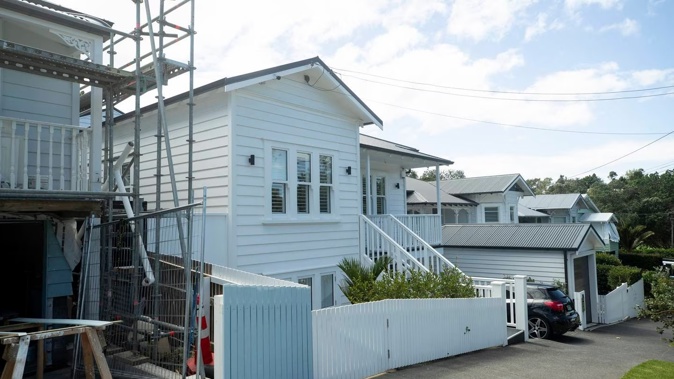
An Auckland homeowner says he’s lucky his house didn’t blow up while he was holidaying overseas after rats chewed through piping, causing a major gas leak.
Now Grey Lynn resident Jeff Blue is calling for changes to regulations governing multi-layer gas pipes - made from a composite of plastics and aluminium - saying it’s a matter of time until someone is hurt or dies.
Pipe manufacturer Reliance Worldwide Corporation (RWC) says its products meet all official standards, while the NZ Plumbers, Drainlayers and Gasfitters Association says it has not heard of many instances of rats chewing through gas pipes.
Blue, however, said a potential explosion was only averted at his home thanks to builders working on the property next door.
They called him early one morning while he was overseas saying they could smell gas coming from his property and needed someone to open the house up as quickly as possible or else they’d have to call the fire brigade.
Blue said so much gas had by that time spilled into his house that had someone lit a spark, the explosion could have spread to nearby homes.
“Not just our house, but probably the surrounding neighbourhood would have been taken out as well,” he said.
While multi-layer pipes (MLPs) have become highly popular in the building industry – especially in new homes – over the last 10-15 years, Blue believed the ability of rats to chew through them made them a “systemic” risk in homes across the country.
“Unfortunately, rats and vermin are commonplace in many parts of New Zealand,” Blue said.
Rats are known to chew on objects around houses with two common explanations given by pest controllers.
One is that rats’ main teeth grow very quickly and the animals chew on objects to wear their incisors down and stop them from growing too long.
Another common explanation is that when poisoned, rats typically go looking for water and often chew on water pipes.
/cloudfront-ap-southeast-2.images.arcpublishing.com/nzme/66QVJICIOJFEFJLOGCGIE2SRVU.jpg)
Damage that Grey Lynn resident Jeff Blue says rats did to his gas pipes by chewing through them.
/cloudfront-ap-southeast-2.images.arcpublishing.com/nzme/DDZZAK5X3ZDHLIWX7HM4EF66AU.jpg)
Jeff Blue says the damage done to the pipes could have led to an explosion at his house. Photo / Jeff Blue
“I mean it just shocks me that you can have mains pressure gas which has this vulnerability,” Blue said.
“Gas is a very different proposition because it has a nasty habit of going bang in quite a big way.”
He said he called in a plumber and certified gasfitter to check his house after the gas leak.
They cut a series of holes along the gas lines in the wall and ceiling looking for damage before finding a section of RWC-manufactured multi-layer pipe that had been chewed through by rats, Blue claimed.
He contacted RWC about the damage but was unhappy with their response because they did not accept responsibility, instead ruling the leak as being caused by an “act of nature”, he said.
He also replaced all the pipes with copper piping and used a pest controller to eliminate the rats.
Blue said he wanted regulators to study how easy it is for rats to chew through multi-layer pipes and perhaps mandate copper or steel pipes to be used instead.
Grant Mason, a certified gasfitter who is a former vice-president of the NZ Plumbers, Drainlayers and Gasfitters Association, said multi-layer pipes’ advantage is that they’re cheaper and typically easier to use once you have the right tools.
Whereas copper pipe connections have in the past needed to be welded closed - requiring extra labour and insurance costs because plumbers need to obtain special “heat permits” for each job - multi-layer pipes can be sealed off easier, without using open flames around the gas systems.
The multi-layer pipes are made from three layers: an outer plastic polymer, an aluminium layer in the middle and another inner plastic polymer.
Phil King, director of group investor relations at manufacturer RWC, said MLPs have been used in homes and commercial sites around the world for many years.
They were approved here when New Zealand adopted the Australian gas installation standard in 2010 but in practice have been permitted for local use for at least 20 years, he said.
/cloudfront-ap-southeast-2.images.arcpublishing.com/nzme/BPLGYZYYUBDGLJJ7LQRFFNV2HQ.jpg)
Replacement copper pipes installed by Jeff Blue.
Jeff Blue says if there was an explosion it could have affected his neighbour's homes as well, given their proximity. Photo / Dean Purcell
“There are at least five major gas MLP systems in the New Zealand market, and all of these products are of similar construction and durability and are required to meet the current standard,” he said.
Regulators also brought in a new requirement in September last year that required multi-layer pipe systems to be fitted with an “excess flow valve”, King said.
This is primarily designed to stop gas flow during a house fire but would also work to stop gas flow for any significant leak in a gas system, such as one coming from damaged kitchen appliances or pipes, he said.
While the new standard did not require existing homes to be retrofitted with this valve, King said “it is a cheap, simple and effective mitigation for significant gas leak events” that homeowners can install if they are concerned about safety.
“We note that any pipe or electrical cable can be subject to wear and tear, including from corrosion, flooding, earthquakes, fire etc. The instances of rodents eating through gas pipes are extremely low,” he said.
Glen Burr, president of the NZ Plumbers, Drainlayers and Gasfitters Association, said he had not heard of many instances of rats chewing through gas pipes.
He didn’t think it was a widespread problem but said it was something his association could look into and consider issuing guidance to members and information to the public.
That might include warning the public that this could happen and reminding gasfitters to run extra checks over systems when customers complain about rats.
Fellow gasfitter Mason, speaking from his personal perspective, said he always recommended copper pipes to customers because they were more durable in fires and against rat teeth.
However, he said customers often chose multi-layer pipes because they are cheaper.
But Blue wanted to see more done because he believed multi-layer pipes are “not fit for purpose”.
“Someone could get seriously injured, if not killed,” he said.
Take your Radio, Podcasts and Music with you

/cloudfront-ap-southeast-2.images.arcpublishing.com/nzme/KNE4FA3WWFBJNJHODDBGPTFSUE.JPG)








